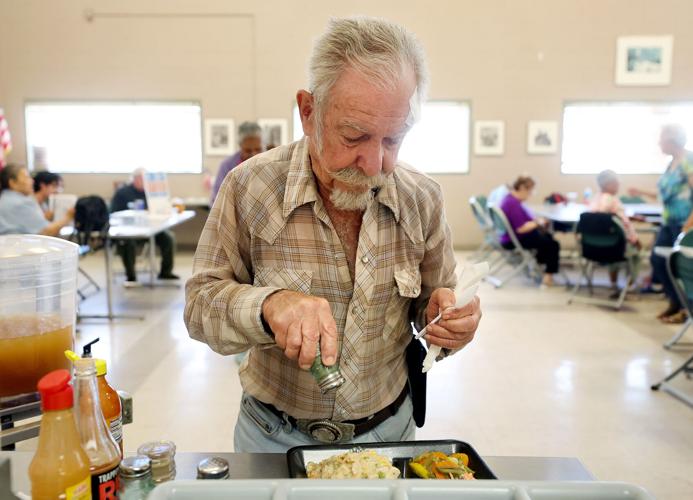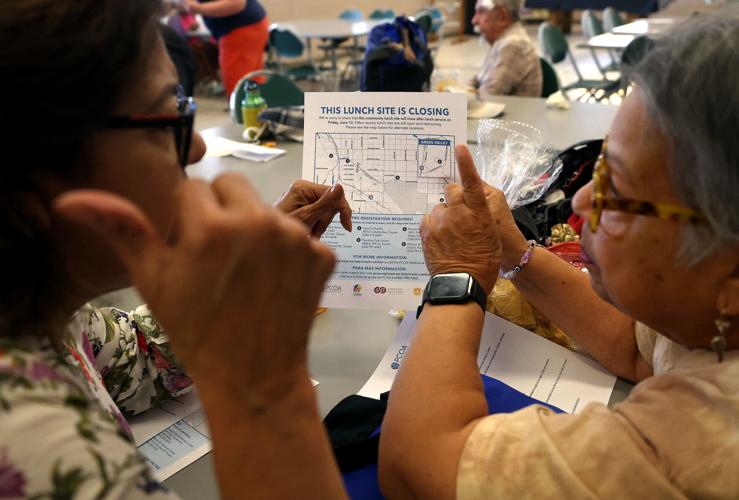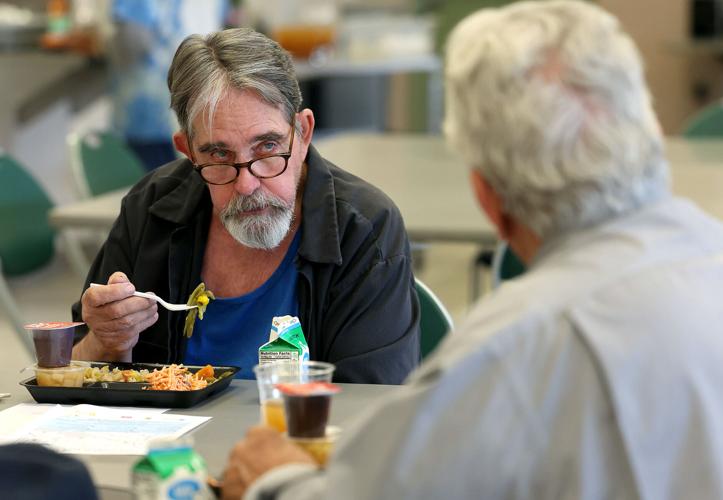Several free meal sites that serve hundreds of Seniors across УлшжжБВЅ will close next month due to federal funding cuts, officials say.
The closures could impact up to nine meal sites across Pima County, the Pima Council On Aging said Friday.
June 13 will be the final day for meals at the following locations that are operated by Catholic Community Services:
- El Pueblo Activity Senior Center, 101 W. Irvington Road.
- Quincie Douglas Center at Silverlake Park, 2420 S. Kino Parkway.
- Ellie Towne Community Center, 1660 W. Ruthrauff Road.
- Saguaro Christian Church, 8302 E. Broadway.
Another site the agency operates, Casa de Esperanza in Green Valley, is expected to stay open as PCOA continues to work with тlocal partners,т though an operating deal has yet to be finalized. And a meal site in Ajo will transition from a sit-down site to home-delivered meals, PCOA said.
People are also reading…

Leland Coartney, 82, adds seasoning to his food during lunch Friday at Quincie Douglas Center, 1575 E. 36th St.
About 300 clients across the county are served through the congregate meal site program, Catholic Community Services said.
Further, three meal sites operated by the city also will close next month. The sites closing June 27 are:
- Fred Archer Center, 1665 S. La Cholla Blvd.
- Donna Liggins Center, 2000 N. Fourth Ave.
- El Rio Neighborhood Center, 1390 W. Speedway.
Meanwhile, a shake-up in the Meals on Wheels program will also occur in June, but service to clients who receive home-delivered meals should be unaffected when Catholic Social Services leaves the program and other agencies will fill the void, PCOA said.
Mary Villegas said sheтs helped out at the Quincie Douglas Center location for about a year, usually setting up the kitchen and connecting with patrons. She said a lot of the people who come in could use the free meal as well as some companionship, something sheтs sad to see go.
тA lot of them have problems, but they donтt just trust anybody. Here, they can find somebody trustworthy,т said Villegas, a member of PCOA partner Project Ayuda. тI felt like this was coming, with all the federal cuts. Itтs just a sad situation for these elderly people who, you know, donтt know where their next meal could come from.т

Maricruz Jones, left, and Edna Leiva talk about where they can go get lunch provided by Pima Council on Aging after learning Friday that meals at Quincie Douglas Center are set to end next month.
тWhen I first heard, it was surprising,т said David Ruiz, a patron of over 12 years, тIтve been coming here a long time.т
Ruiz said he usually just comes for the meals, but appreciates talking to other patrons from time to time.
тItтs sad, because we are getting old and want to stay at this site. Itтs not good,т said Maricruz Jones, adding that sheтll miss being able to get a meal and socialize before taking part in another program at the center that allows her to do crafts on Wednesdays.
Suspending services will be тdevastating to our senior communityт in more ways than just meals, Elena Dwyre, CEO of Catholic Community Services.
тOur congregate meal centers provide more than just a meal т they serve as vital social hubs,т she said. тFor many of our seniors, this is their only opportunity for face-to-face interaction, which is essential for mental health and combating social isolation.т
тHalting these services was a last resort ... But we can no longer afford to provide these meals without reliable funding. This pause in service is deeply felt by the community, and we are committed to working with our partners and supporters to seek new pathways forward,т Dwyre said.
Similarly, Robert Ojeda, president and CEO of PCOA, said the decision to cut or alter services was not made lightly.
тCongregate meal sites are more than just a place to eat т they are critical hubs for connection, wellness, and support ... With the increased pandemic-era funding, we were able to bring nutrition services closer to meeting the communityтs needs,т Ojeda said. тThat funding has now gone away, but the need has not. We have sustained more sites than our current budget supports, and unfortunately, we can no longer do so.т
One of the funding sources affecting PCOA is the sunsetting of American Rescue Plan Act (ARPA), said Tim Kromer, executive director of philanthropy for Catholic Community Services.

Dan May, left, talks with David Ruiz during lunch Friday at Quincie Douglas Center. The breakfast and lunch programs at the center will end on June 13.
The federal relief package of 2021 was meant to help municipalities with the financial impact COVID-19 had on public health and local economies. Local governments had to commit their remaining ARPA dollars for projects by the end of 2024, with the spending period for that funding ending in December 2026.
PCOA also receives funding from the (OAA), which was first enacted in 1965, said Ojeda. A change in the тinterstate funding formulaт of the OAA has been part of this impact, he said.
Ojeda said the pandemic-era funding like ARPA dollars allowed organizations like PCOA to expand its services greatly. Now that those dollars are ending, agencies are having to make cuts.
т(The COVID-era funding) was of course a beneficial thing for our community ... but the reality is that weтve been trying to do the most possible knowing that funding was starting to be reduced over time,т he said. тAs we look at next yearтs budget, thereтs going to be $3 million less for us from federal funding, and so that is why we need to make some of these (cuts) to just be prepared for reduced funding next year.т
Catholic Community Services and the city operate as contractors for the Pima Council On Aging services, said Kromer. The funding cuts mean 24 staffers at the agency will be тaffected,т he said.

















